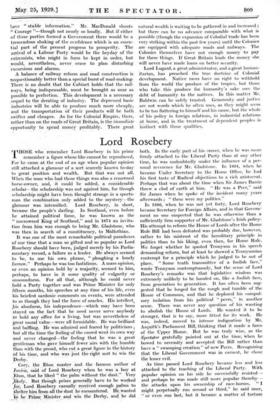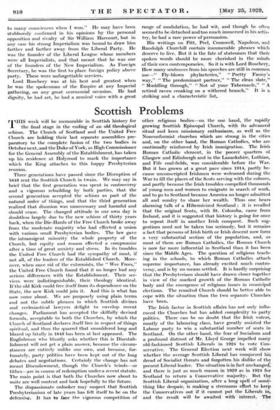Lord Rosebery
trHOSE who remember .Lord Rosebery in his prime -L• remember a figure whoSe like cannot be reproduced. For he came, at the end of an age when popular* opinion still attached a glamour of a sort scarcely known to-day to great position and wealth. But that was not all. When the man who had those things was also a renowned horse-owner, and, it could be added, a considerable .scholar—the scholarship was not against him, for though scholarship might have been thought strange in a sports- man the combination only added to the mystery=the glamour was intensified. Lord Rosebery, in short, became the people's darling. In Scotland, even before he attained political fame, he was known . as the ." uncrowned King of Scotland," and in 1874 an invita- tion from him was enough to bring Mr. Gladstone, who was then in search of a constituency, to Midlothian.
It was one of the most remarkable political- paradoxes of our time that a man so gifted and so popular as Lord ,Rosebery should have been, judged merely by his Parlia- mentary record, a failure as a leader. He always seemed to be, to use his own phrase, " ploughing a lonely furrow." Perhaps he was too fastidious. A mass opinion, or even an opinion held by a majority, seemed to him, perhaps, to have in it some quality of vulgarity or unsoundness. For all that, although he could never hold a Party together and was Prime Minister for only fifteen months, his speeches at any time of his life, even his briefest sardonic comments on events, were attended to as though they had the force of oracles. His intellect, his aloofness, his independence—which may have been stayed on the fact that he need never serve anybody or hold any office for a living, but was nevertheless of great moral 'value—were all formidable. He was brilliant and baffling. He was admired and feared by politicians ; but all the time the feeling of the crowd went its own way and never changed—the feeling that he was a great gentleman who gave himself fewer airs with the humble than with the proud, who cut a great figure in the history Of his time, and who was just the right sort to win the . _ Derby. tory, the Eton master and . the famous author of itenica, said of Lord Rosebery when he was a boy at Eton, that he liked the palm without the dust." Very ,likely. But thOugh prizes generally have to be worked for, -Lord Rosebery casually received enough palms to shelter him from all the dust he encountered. He wanted to be Prime Minister and the Derby, and he did both. In the early part of his career, when lie was more firmly attached to the Liberal Party than at any' other time, he was undoubtedly under the influence of a per- sonal reverence for Mr. Gladstone. In 1881, when he became Under Secretary to the Home Office, he had his first taste of Radical objections to a rich aristocrat. Perhaps that was about the time when Sir James Barrie threw a clod of earth at him. " He was a Peer," said Sir James when he' spoke of the incident many years afterwards ; " these were my politics."
In 1886, when he was not yet forty, Lord Rosebery became Secretary for Foreign Affairs, and in that Govern- ment no one suspected that he was otherwise than a sufficiently firm supporter of Mr. Gladstone's Irish policy. His attempt to reform the House of Lords after the Home Rule Bill had been defeated was probably due, however, rather to his mistrust of the hereditary principle in politics than to his liking, even then, for Home Rule. We forget whether he quoted Tennyson in his speech demanding reform, but at least he showed a Tennysonian contempt for a principle which he judged to be out of place. " Some tenth transmitter of a foolish face," wrote Tennyson contemptuously, but the sense of Lord Rosebery's remarks was that legislative wisdom was extremely unlikely to be handed on, like a foolish face, from generation to generation. It has often been sug- gested that he longed for the rough and tumble of the House of Commons; and that he deplored his compul- sory isolation from his political " peers," in another sense. There was never any question of his wanting to abolish the House of Lords. He wanted it to be stronger, that is to say, more fitted for its work. He was, indeed, moved to intense indignation by Mr. Asquith's Parliament Bill, thinking that it made a farce of the Upper House. But he was truly wise, as the Spectator gratefully pointed out at the time, when he bowed to necessity and accepted the Bill rather than have a " swamping creation" of new Peers. Recognizing that the Liberal Government was in earnest, he chose the lesser evil.
As time passed Lord Rosebery became less and less attached to the teaching of the Liberal Party. With popular opinion on his side he successfully resisted— and perhaps he was made still more popular thereby— the attacks upon his ownership of race-horses. " I might perpetually run second or third," he said once, " or even run last, but it became a matter of torture to many consciences when I won." He may have been stubbornly confirmed in his opinions by the personal opposition and rivalry of Sir William Harcourt, but in any case his strong Imperialism was bound to draw him farther and farther away from the Liberal Party. He was the founder of the Liberal League whose members were all Imperialists, and that meant that he was one of the founders of the New Imperialism. As Foreign Secretary, he was the first to place foreign policy above party. These were unforgettable services.
Lord Rosebery was at his best and greatest when he was the spokesman of the Empire at any Imperial gathering, on any great ceremonial occasion. He had dignity, he had art, he had a musical voice with. a great range of modulation, he had wit, and though he often seemed to be detached and too much immersed in his artis- try, he had a rare power of persuasion.
His writings on Pitt, Peel, Cromwell, Napoleon, and Randolph Chin-chill contain innumerable phrases which deserve to live. But it is the fate of statesmen that their spoken words should be more cherished in the minds of their own contemporaries. So it is with Lord Rosebery. How many sentences from his speeches are still in common use--" • Fly-blown phylacteries," " Pretty Fanny's .way," " The predominant partner," " The clean slate," " Muddling through," " Not of your Tabernacle," " A retired raven croaking on a withered branch." It is a striking and a characteristic list,









































 Previous page
Previous page